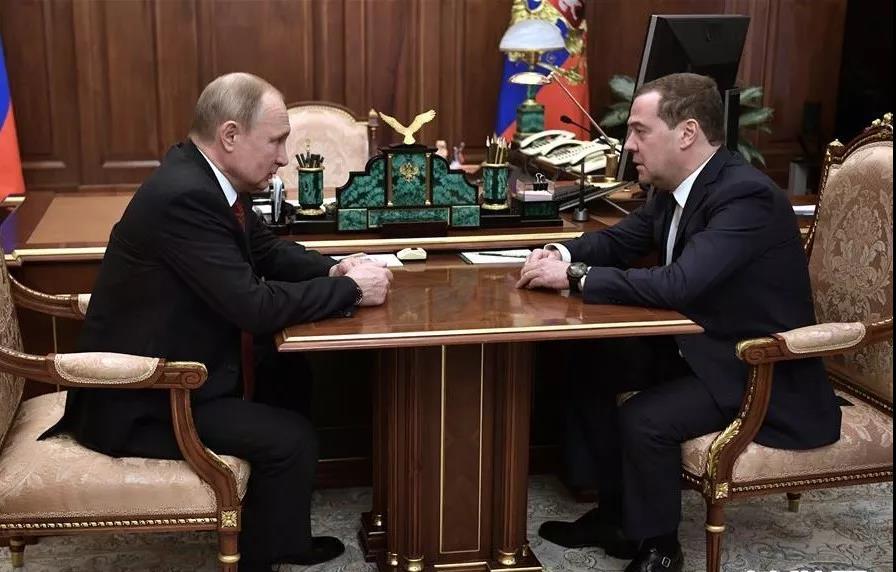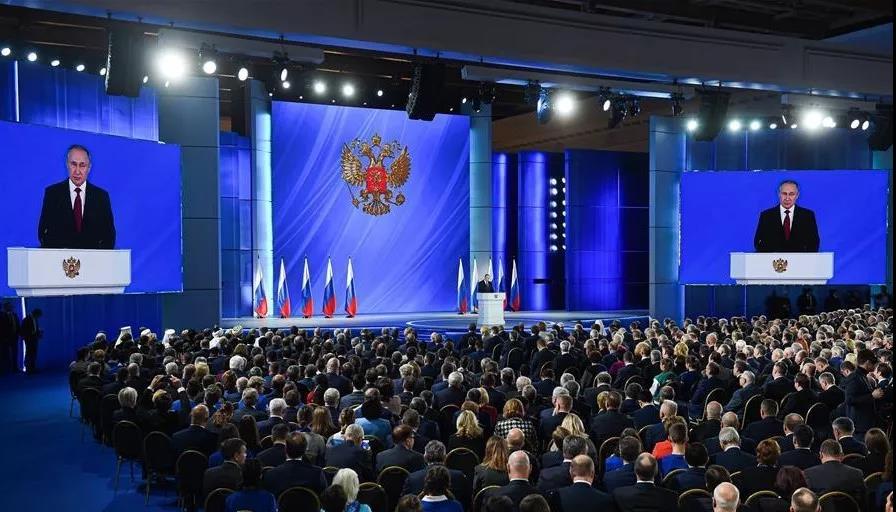Has Medvedev broken up with Putin?
January 18, 2020
Introduction: Will Putin remain president in 2024? Where will Russia go? Before the eyes of the public, on January 15, 2020, Putin issued a State of the Union address followed by the resignation of the Medvedev administration, officially opening Russia's 2024 political drama.
(Credit: xinhuanet)
I. Putin lifts the curtain on Russia's 2024 political drama early
Both Mr. Putin's proposal to amend the constitution and the resignation of Medvedev's government were sudden. A Russian government minister said anonymously to the Russian media that they knew nothing about the meeting, "it’s a bolt from the blue". But for Putin, obviously, it was planned. Hours after Medvedev's government resigned, Putin had chosen a new prime minister. This was not planned on a sudden impulse, but the beginning of a well-orchestrated drama. As the director of the drama, Putin lifted the curtain in advance. First, he wanted to give the audience clear expectations to ensure social and political stability; second, to test the loyalty and performance of the main actors. Those who did not meet the requirements could go.
II. Have Putin and Medvedev broken up?
Immediately after Putin delivered the annual State of the Union address, Russian Prime Minister Dmitry Medvedev called for the resignation of the entire Russian government. Does Medvedev wants to hang on, or does Putin want to abandon him?
Perhaps neither is true.
In Russia, the resignation of Medvedev had long been anticipated. Medvedev served as Russian president and prime minister for nearly eight years. After he became prime minister again in 2012, Medvedev's reputation fell as Russia's economy faltered and mounting allegations of corruption. Medvedev's resignation as prime minister was a concession to public opinion.
It is worth noting that his resignation as prime minister does not mean that Medvedev has since washed his hands of politics. On the contrary, Medvedev will remain one of the select band of leading actors on the Russian political stage.
Medvedev is one of Putin's few absolute confidants. Medevedev was Putin’s subordinate when he was still working in St. Petersburg. Over the years, after Putin came to power, Medvedev became Putin's right-hand man, and successively served as the Director of the General Office of the President, First Deputy Prime Minister and Prime Minister. Even during his presidency from 2008 to 2012, Medvedev closely followed Mr Putin's political lead.
Instead of abandoning his brother, Putin immediately appointed Medvedev as Deputy Chairman of the Security Council of the Russian Federation. The Security Council of the Russian Federation is Russia's top advisory body for security decision-making and Putin is the Chairman. Previously, there were 12 permanent members, including the Secretary and Deputy Secretary, the Director of the Federal Security Service, the Director of The Foreign Intelligence Service of the Russian Federation, the Minister of the Russian Ministry of Defense, the Minister of the Russian Interior Ministry, the Prime Minister, the Chairman of the Upper and Lower Houses of Parliament, the Director of the General Office of the President, and the Minister of the Ministry of Foreign Affairs of the Russian Federation. In accordance with regulations, the Security Council of the Russian Federation is a constitutional advisory body, in charge of drafting national policy on security issues for the president of Russia, comprising national security, public security, ecological security, personal security and pursuing a policy of national unity in protecting important personal, social and national interests from internal and external threats. The resolutions drafted by the Security Council also cover national defense organizations, military construction, military production, foreign military and military cooperation, and international cooperation in the field of security. The Deputy Chairman of the Security Council of the Russian Federation is a new position, ranking above the Secretary of the Security Conference. So it's not a sinecure but a very important position, similar to the Vice President of the United States. Putin said he would put Medvedev in charge of defense and security. Russia, as a martial nation, has always put top priority on military and security affairs. In the future, the launch of new missiles and the signing of military purchase orders will be a good opportunity for Medvedev to shine and boost his reputation.

(Credit: Xinhua News Agency, RIA Novosti)
III. How will Putin amend the Constitution?
First, Putin has made it clear that he will not seek another term of office in 2024, and no one should serve more than two terms in the future. At the annual press conference on December 19, 2019, Putin said he did not want to be re-elected as president. Putin added that the expression "consecutive" should be removed from Russian Constitution's statement that "the same person shall not hold the presidency of the Russian Federation for more than two consecutive terms". Such an amendment to the constitution would mean that after leaving office in 2024, not only would Putin not run for President in future, but future presidents will only be able to serve for a maximum of 12 years.
Second, Putin, despite not being the President, will remain in control of the country and the general direction of Russian politics. In February 2019, Mr. Surkov, one of Putin's key advisers, published an article on "The Long-term Putin State". Even if Putin ceased to be president after 2024, it was thought, the political system that Putin had created would operate for a long time and retain lasting influence. Now, the plan will begin to be implemented through constitutional amendments. In a televised speech, Medvedev said President Putin had outlined some "fundamental changes" of the Russian Constitution during his State of the Union address, "which, if adopted, are likely to come into effect following discussions. These changes will not only affect some articles of the Constitution but also have a significant impact on the overall balance of power". In his State of the Union address, Putin has made clear the future power structure. These are some key points worth noting:
1. Council of State. The Russian Council of State is a non-constitutional body established by presidential decree signed by Putin in 2000. Putin serves as Chairman, and its members include the speaker of the upper and lower houses of parliament, the leaders of the lower house of parliament and leaders of the Russian regions. In his State of the Union address, Putin stressed the need to consolidate the role of the Council of State in the Constitution. "At my initiative, the Council of State has been very effective during recent times, and the leaders of all regions have shown a high degree of efficiency.” Obviously, according to Putin's design, the future Council of State will not only become the constitutional body of Russia, but even the core of its future power structure. As Chairman of the Council, Putin will continue to play the roles of designer and director in the Russian political arena after 2024.
2. The power of the President has been reduced and those of the Parliament expanded. In his State of the Union address, Putin also proposed expanding the powers of the Russian Duma (lower house of parliament) and the Federal Council (upper house of parliament). This time, Putin proposed giving the State Duma the power to confirm the Prime Minister, and then, on the advice of the prime minister, confirm the cabinet members, and the President must appoint the candidates proposed by the State Duma. "These are very significant changes in the national political system that will enhance the role and significance of the parliament", Putin said. Putin also proposed authorizing the Russian Federal Council to remove judges from the Constitutional Court and the Supreme Court on the advice of the president. Under Mr. Putin's proposals, it is clear that the power of the future president will be weakened, while the power of parliament will be strengthened. That would make it easier for a president with reduced powers to be controlled after 2024, while Putin could influence the Federal Council through the Council of State, which covers regional leaders, and the State Duma through the support of his own party.
Conclusion
This year's drama has been well prepared. Instead of chaos in Russia, its political situation will be more certain and stable. Putin, who will retire in 2024, will remain the chief architect of Russia's political scene.
—————————————————————
ON TIMES WE FOCUS.
Should you have any questions, please contact us at public@taiheglobal.org

